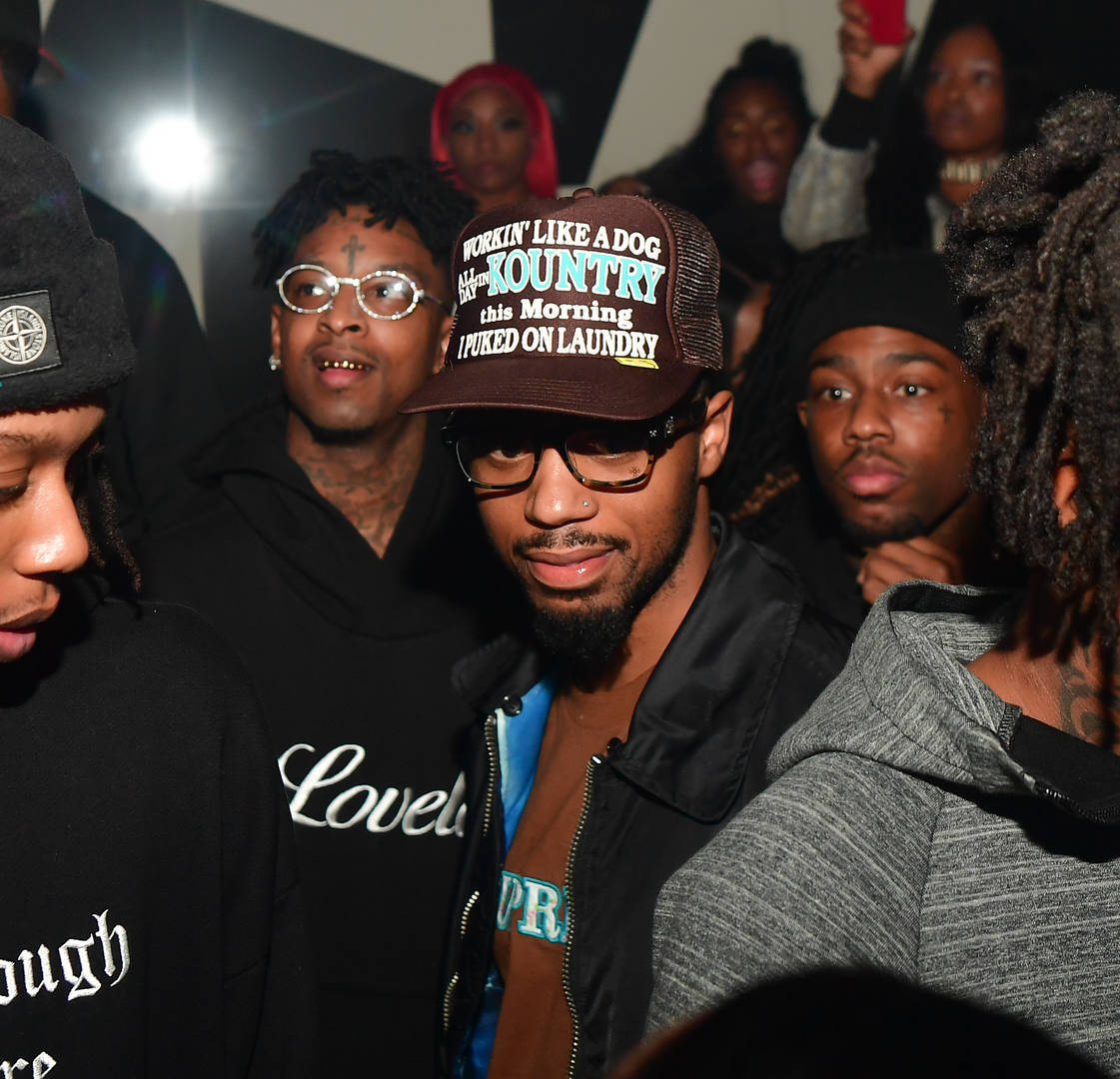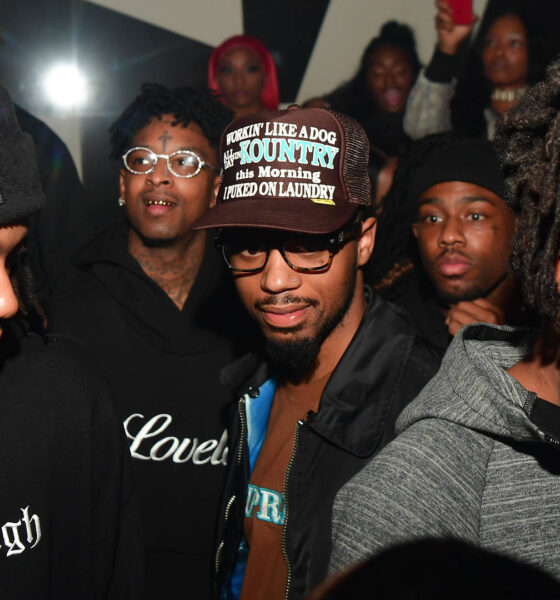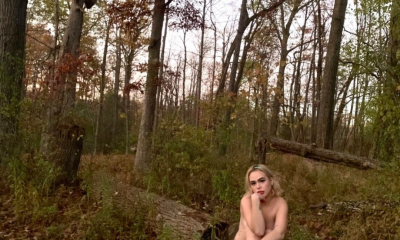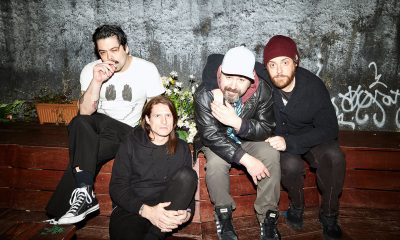

Story
21 Savage & Metro Boomin “Savage Mode 2” Review
Savage Mode plays out like a low-budget horror film. An indie production in nine scenes filled with bleak raps detailing the horrors of East Atlanta through the sometimes-sociopathic mind of 21 Savage. Forever strapped with an arsenal of weapons, and a tattoo of a knife on his forehead to show for it, the latest Boogeyman out of East Atlanta emerged.
It’s a minimalistic body of work, down to the hollowness in 21 Savage’s voice. Metro’s production on Savage Mode is eerie and spacey, occupying vacancies in between each of Savage’s bars with suspense and analog static. Eerie flutes and murderous 808s become the score to Savage’s journey for money and power. They’ve attained both yet there’s still a hunger for more. In the years since they initially joined forces, they’ve dropped critically acclaimed solo efforts with Grammys and multiple accolades that followed.
Savage Mode 2, the glossy follow-up to their grainy 2016 cult classic, builds off of the bleak atmosphere that was created on the first installment, transforming it into a major motion picture event with eye-popping artwork and Hollywood star-power. This was evident immediately when the cinematic trailer used to announce the project was narrated by Morgan Freeman, who also extends his talents throughout the project’s skits.
Savage Mode 2 kicks off with a monumental introduction to 21 and Metro’s return. Freeman’s calming vocals juxtapose the anxiety-inducing piano loop, bringing the same sense of urgency as an opening scene of a 90s action-suspense “Great men with great ideals can be separated by hundreds or even thousands of miles and still be in the same place,” Freeman says. “When these men join forces to put the focus of reaching the same goals, to attain the same outcomes, they are not two, but one.” It’s the thesis to Savage Mode 2 — apart, they’re forces to be reckoned with, but together, they’re unstoppable. The beauty of Savage Mode and its sequel is that it’s really a brainchild of Metro and 21 Savage; a perfect middle point of their respective geniuses where Metro’s spooky production and 21 Savage’s often grim and sometimes nihilistic lyrics meet, down to the first drop. “Called the first one Savage Mode, my mood, that’s what it was/ 2016 we was runnin’ around, beatin’ n***as up in the club,” Savage raps in unison to the first kick of the project, following a villainous cackle and his latest go-to ad-lib: “pussy.”

Prince Williams/Wireimage/Getty Images
Since the release of NOT ALL HEROES WEAR CAPES, Metro Boomin has gotten even more comfortable as an overall conductor, or executive producer, overseeing each song to detail. His success rate often depends on the collaborator, as witnessed with the underwhelming joint effort with Big Sean, Double Or Nothing. But Savage, too, has acquired a certain attention to detail and care to his rhymes. It was a noticeable development on i am > i was in comparison to Issa. There’s intent in each bar. He’s experimenting with flows further, taking note from Southern legends that he paid homage to on the cover art.
On “Snitches and Rats” ft. Young Nudy, 21 asserts himself as an authoritative voice for the streets in the commercial landscape. The Voice of God provides the definitive difference between a rat and a snitch, a topic that started to pick up in public discourse since 6ix9ine cooperated with authorities. Though relevant as ever, it’s an in-depth exploration of a subject that frequents Savage’s music — loyalty. Trust issues have remained a fixture in his years, stemming from when he was actively in the streets. 21 Savage presents himself to be this isolated figure, plotting away at world domination out of plain sight (or at least, that’s how I’ve seen him since those ESPN memes started circulating). The rapper’s mysterious nature has been his most alluring characteristic. The space he occupies in rap is one he holds in solitude frequently, and Metro is among the very few that can sit comfortably within it. The bond and trust that’s dramatically detailed by Morgan Freeman in the intro is proven by the execution of Savage Mode 2.
In the years since releasing their respective solo projects, much has happened for 21. “My Dawg” remains one of the most insightful looks into 21 Savage’s life. Eerie piano keys that sound like they’re coming straight out of a 90s slasher flick back Savage as he addresses the realities of his status in America. It’s an even deeper look into the rapper’s origin story, explaining that even with his legal status in America at risk, he was forced to provide for himself and his mother. “No social security, couldn’t get a license, but I still didn’t complain/ I went and got it, I ain’t ask for no handout/ Lil n***a, we are not the same,” he raps. Even still, it’s a moment where he extends his own penchant for memes to fire back at the ones that riddled the timeline in the wake of his arrest. “N***as keep talkin’ this U.K. shit like I ain’t got A.Ks.”
Sequels, especially ones with bigger budgets, often result in an overbearing amount of star power, whether it’s a film or an album. Thankfully, that wasn’t the case with Savage Mode II. Young Thug helps Savage explore his R&B side a bit more deeply on their ode the players, “Rich N***a Shit.” Meanwhile, Drake adds little to the project, if not allowing 21 Savage to further explore his loverboy side and of course, Metro’s vocal sample. Oh, and embarrassing SZA.
21 Savage and Metro Boomin created a unique strain of trap on Savage Mode that has become difficult to replicate or emulate to the same success. Even for the creators themselves. Their personal and professional growth wouldn’t have allowed them to recreate that same untapped rawness again on Savage Mode II. The sequel explores the influences of horrorcore legends from the South that came before them with elegant orchestral sections and colossal 808s. Savage Mode II is a glorious expansion of the undeniable chemistry they introduced four years ago, further cementing 21 Savage and Metro Boomin status in the pantheon of rapper-producer duos. A sequel that disappoints, Savage Mode II is not.
Stay updated! Click the Google News follow button for more news and updates.
Follow on Google NewsFeatured
Eddie Castillo’s Powerful Ocean Conservation Video Campaign

“We are the last generation that can save the oceans, and we are the first generation that must learn to live without them.” – Silvia Earle

By Altered State Productions
The Ocean Foundation has taken on a mission of critical importance: to save our dying oceans from the irreversible damage caused by human activity. With marine ecosystems teetering on the brink of collapse, the organization’s latest campaign aims to educate and inspire action through the power of storytelling.
Meet Eddie Castillo, Founder of Dallas production company Altered State Productions and media director who’s passionate about the ocean’s survival. His latest project with an ocean conservation organization takes viewers on an emotional journey, blending breathtaking aerial footage with a powerful stewardship message.
“It’s easy to become numb to the devastation happening around us”, says Castillo, “We scroll past images of environmental destruction, momentarily horrified, yet quickly moving on to the next distraction.” While other campaigns often depict the devastation—plastic, trash, turtles entangled in debris—the Last Generation campaign strives to remind us of the beauty we are at risk of losing forever. The brand video captures the ocean’s waves hitting the shore, smooth and therapeutic.

Castillo’s work, reminiscent of National Geographic’s Planet Possible, combines awe-inspiring visuals with a profound sense of responsibility for our planet. Using advanced drone technology, Castillo captured mesmerizing scenes of Hawaii’s North Shore, showcasing the pristine beauty of marine ecosystems under threat. These stunning visuals, paired with philosophical narrations by Alan Watts and a cascade of electronic synths, create a dreamlike quality that blurs the lines between reality and fantasy.
The Ocean Foundation’s storytelling hinges on compelling imagery, reminding us of our collective responsibility to protect these fragile ecosystems. By raising awareness and inspiring change through the power of commercial video production, the project serves as a rallying cry for ocean literacy, species protection, and habitat preservation.
Altered State Productions proudly circulates its media campaign through syndicated sources, utilizing targeted messaging that hits viewers on a different level. “As a media production company, our mission is to create impactful messages that drive real change,” says Brian Medina, Communications Director at Altered State Productions. “We pour our hearts into every project, hoping to make a difference. We’ve successfully generated over a quarter billion dollars in attribution for brands and companies worldwide. If we can do that for profit, imagine what we can achieve for causes worth standing for.”
The media agency’s impressive portfolio includes over 96 nationally aired TV ad campaigns for brands like Jameson, Valyou, and OWN.

In one scene, two young children hold up a surfboard to protect themselves from an incoming wave, playing innocently as kids do. The scene cuts to a breathtaking timelapse of an iridescent coral reef, with aqua blue currents turning the rock. This moment signals that those two kids could be the last to witness such beauty, delivering the hard-hitting message of what we stand to lose—an ocean and all its wonder, and the chance to truly experience it.
In the end, we are faced with the undeniable truth that if we do not act, our children and their children may never know the oceans’ true splendor, leaving behind only a memory of what once was—a heartbreaking legacy of neglect, making the next generation, possibly the last generation.
Altered State Productions is a video production company and digital marketing agency, specializing in video editing services that propel brands with competitive advertising.
Business
How to Get Your Music on Spotify’s Algorithmic Playlists

Hey there, music maker! Let’s chat about:
* The cool types of algorithmic playlists out there
* How Spotify’s playlist magic works
* Some nifty tricks to get your tunes on these playlists
* Ways to boost your chances of playlist success
* Some final thoughts to keep you inspired
Spotify’s Algorithmic Playlists: Your New Best Friend
Wondering how to get your music featured on Spotify’s playlists? No need to stress we’ve got you covered! Here’s the lowdown;
Option 1; Create a hit song that gains 5,000 to 10,000 streams, within the two weeks of its release. Sounds challenging? Keep reading!
Option 2; Consider using our Spotify advertising campaign to boost your streams and potentially catch the attention of those playlists.
Option 3: Use Spotify ad campaign to trigger the algorithm

Let’s dig in shall we?
Promoting your music on Spotify is like amplifying your voice in a room. Those algorithmic playlists? They’re like winning lottery tickets for artists helping them connect with listeners and even securing a spot, on Spotifys curated playlists. Stuff, right?
Think of these playlists as your music’s personal matchmaker. They introduce your tunes to listeners who might never have found you otherwise. It’s like having a friend who’s always saying, “Hey, you’ve got to hear this!”
Landing on a popular algorithmic playlist can give your Spotify profile a serious boost. And if you’re lucky enough to hit a trending playlist? Well, that’s when things can really take off!
What kinds of algorithmic playlists are out there?
Spotify’s algorithm is like a DJ that knows exactly what each listener wants to hear. Here are some of its greatest hits:
Discover Weekly:
Your personal Monday mixtape, filled with new tunes and old favorites.
Daily Mix:
A fresh playlist every day, blending your faves with similar tracks.
Release Radar:
Friday’s new music party, featuring your top artists and similar sounds.
Your Library:
A mix of your likes, saves, and new releases from your favorite artists.
On Repeat:
The songs you can’t stop playing, plus some new recommendations.
Repeat Rewind:
A blast from the past, featuring your old favorites and similar tracks.
Time Capsule;
Take a trip down memory lane personalized for you.
Spotify Radio;
Craft your playlist inspired by any song, artist or music genre.

Ever wondered how Spotify creates its playlists?
Think of Spotifys algorithm, as a music enthusiast robot with a memory. It observes listener preferences examines song details, adapts, to your listening patterns and notes how people engage with songs.Pretty smart, right?
So, how do you get your song on these playlists?
You’ve got two main routes:
Option 1: Create an amazing song that gets lots of love quickly. Aim for 5,000-10,000 streams in the first couple of weeks. Remember, Spotify also looks at things like user engagement and how well your song fits different playlists.
Option 2: Give our Spotify ad campaign a try. It’s designed to boost your streams and often triggers those algorithmic playlists. Plus, the benefits often continue even after the campaign ends!
Option 3: Use a Spotify ad campaign to trigger Spotify’s algorithmic playlists.
Here are some tips to boost your chances:
- Use Spotify for Artists: It’s like your backstage pass. Fill out all the info you can when submitting your music.
- Creating music is essential. It’s a no brainer!
- Share your music; Put your songs on playlists made by users reach out to curators and promote your tracks on media platforms.
- Create your own playlists: Mix your songs with similar artists and try to gain followers.
- Keep at it: Rome wasn’t built in a day, and neither are music careers. Stay patient and persistent!
What’s next after you hit those algorithmic playlists?
Set your sights on Spotify’s editorial playlists. They’re like the Mount Everest of playlist goals and can really launch your career into the stratosphere!
Final Thoughts:
Music promotion can expose your tracks to new listeners and new potential fans. Spotify is a crucial platform to get exposed. Remember, the key to triggering these playlists is getting those streams quickly – aim for at least 5,000 in two weeks. And the more tracks you create and release, the better your chances to hit the algorithmic playlists.
You’ve got this, superstar! Now go make some noise!
-

 Artist Spotlight23 hours ago
Artist Spotlight23 hours ago“Foreign” by OKARO unleashed a symphonic declaration of independence
-

 Music5 hours ago
Music5 hours agoKyra India’s “Ohio”, An Anthem for the Brokenhearted, Rooted in Raw Emotion
-

 Music4 hours ago
Music4 hours agoDUPLEXITY’s ‘Devil In Blue’. A Sonic Sizzle With a Sinister Twist
-

 Artist Spotlight11 hours ago
Artist Spotlight11 hours agoPlasma Chasms sparks a cosmic love affair with “Interstellar Baby”
-

 Music5 hours ago
Music5 hours agoDad’s “Snake Handshake” Slithers Through Industrial Grit with Raw Aggression
-

 Music4 hours ago
Music4 hours agoPlayboy Fresh’s New Single, “IDWIFL,” is a High-Flying Anthem of Lavish Living
-

 Music3 hours ago
Music3 hours agoJody Lynn Sprints to the Heart in Electrifying New Single ‘Running’
-

 News2 hours ago
News2 hours agoBianca Censori Defies Hotel Dress Code in Scandalous Style with Kanye West

